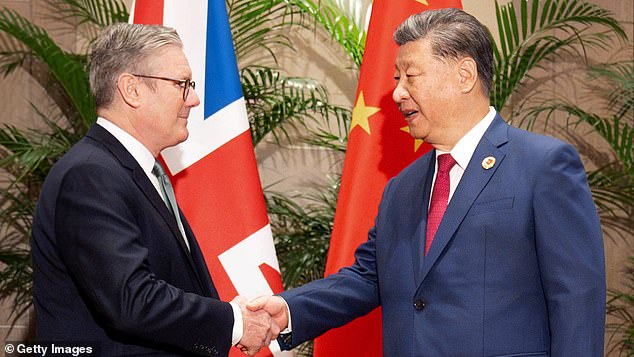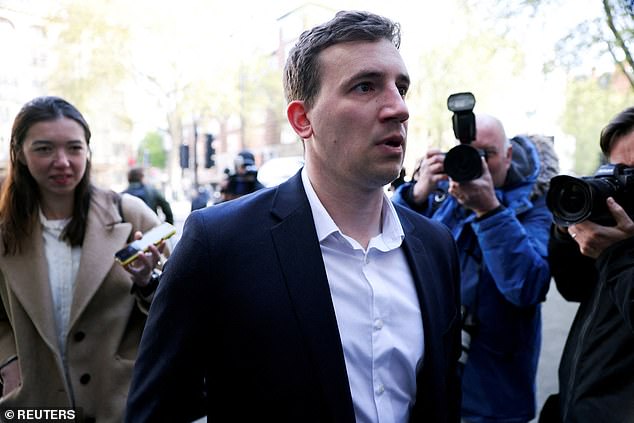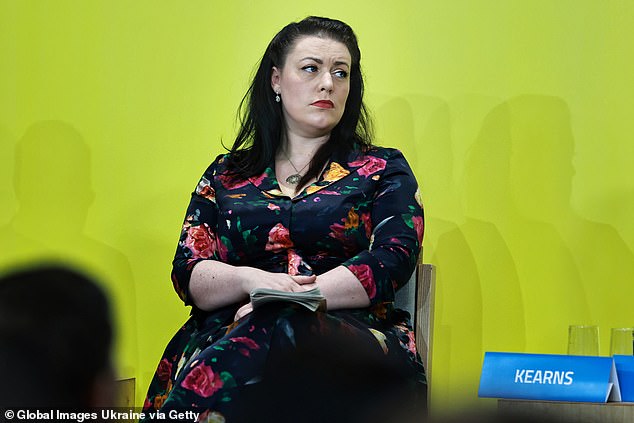Britain is in danger of falling into a debt trap that would hand China ever-increasing influence over UK government policy, Sir Keir Starmer has been warned.
The UK’s national debt is currently around £3trillion, with nearly a third (30 per cent) of borrowing coming from foreign lenders – compared to only a fifth back in 2000.
The precise extent to which Britain relies on China to furnish its debt is unknown as the Treasury does not make such figures public.
But Chinese investment in the UK economy is substantial and leading economists have voiced fears that could lead to a dependence on the Asian superpower and its ruling Communist Party (CCP).
Such policies have been dubbed ‘debt trap diplomacy’, with critics suggesting economic reliance could easily tip over into political influence.
One example regularly cited is Sri Lanka, which had to hand China a 99-year lease on Hambantota International Port after the country ran out of money to repay its debts.
Veteran bond analyst Edward Yardeni said: ‘We have, over the past couple of years, seen accusations that the Chinese are using their leverage over emerging economies that they’ve lent money to actually acquire ports and mines that they’ve helped to build.’
However, the idea of debt trap diplomacy is contested by some analysts, who argue that Sri Lanka’s issues were caused by domestic political decisions rather than being the result of some unhanded Chinese plan.

UK Prime Minister Sir Keir Starmer shakes hands with President Xi Jinping of China while the two leaders were in Rio de Janeiro to attend the G20 summit on November 18, 2024
What is uncontroversial is that China’s reach goes deep into multiple sectors of the UK economy, with investment in the UK’s largest public firms soaring to close to £90billion.
In April this year MPs passed emergency laws allowing the Government to seize control of British Steel’s plant in Scunthorpe from its Chinese owners.
The dispute between ministers and Jingye over the proposed closure of Scunthorpe’s blast furnaces brought fresh scrutiny over China’s role in critical UK infrastructure.
It saw calls for the Government to block China from being allowed to further invest in ‘strategic’ sectors in Britain.
There were also accusations that the Chinese government deliberately sabotaged British Steel to damage the UK, although these were dismissed by Downing Street.
However, fears of China being able to strongarm the UK government have once again emerged as the Chinese spy scandal continues to unfold, The Telegraph reported.
The trial of Christopher Berry and Chris Cash, on charges of passing secrets to China between 2021 and 2023, collapsed last month.
It has since emerged that the Crown Prosecution Service asked repeatedly for the Government to state that ‘at the time of the offence China represented a threat to national security’, but it failed to do so. Both men were formally declared not guilty and deny any wrongdoing.

Christopher Berry, 33, a former teacher in China, was accused of handing about 34 files to his alleged Chinese handler which contained sensitive information apparently gleaned by his friend, Mr Cash, who was working in Parliament at the time

Chris Cash (pictured) was working for the China Research Group, which was a Parliamentary group consisting of China-sceptic MPs, originally founded by Tom Tugendhat, the former Tory security minister. Mr Berry and Mr Cash were set to face trial this month, but proceedings against them were stopped after the Crown Prosecution Service said it could ‘no longer proceed to trial’ due to a lack of evidence

Tory MP Alicia Kearns, 37, revealed how she feared she might have been bugged during a 2022 trip to Taiwan on a fact-finding trip
Both Mr Berry and Mr Cash were arrested at their homes in March 2023 and charged under the Official Secrets Act for passing data to China which was ‘prejudicial to the safety and interests’ of the UK and was ‘directly or indirectly, useful to an enemy’.
Both men strenuously denied the charges. The pair allegedly spied for China between 2021 and early 2023, by which time the China Research Group was headed by Ms Kearns.
Mr Cash allegedly passed sensitive information to Mr Berry in China, who in turn sent 34 ‘reports’ to an individual identified as a Chinese ‘intelligence agent’ – who was said to have then sent the reports to Cai Qi, the fifth-ranking member of Communist Party’s ruling Politburo.
A source familiar with the investigation said British spies first became aware of UK-related intelligence circulating in the ‘Chinese intelligence system’, which led them to identifying Mr Berry first, and through him Mr Cash.
The Tories are now threatening to force a Commons debate so ministers can be probed about the spy saga.
Kemi Badenoch has written to the prime minister seeking ‘clarity and honesty’ over the debacle.
In the letter she wrote: ‘It seems that you and your ministers have been too weak to stand up to Beijing on a crucial matter of national security.
‘Your Government is now on its fourth different story about this scandal. It leaves a strong impression that your Government undermined Britain’s national security because you are too weak to do anything other than appease China.’
Former security minister Tom Tugendhat plans to accuse the Government of ‘selling out’ to Beijing, while Tory MP Alicia Kearns is expected to grill Sir Keir on who made the call to deem China a non-threat.